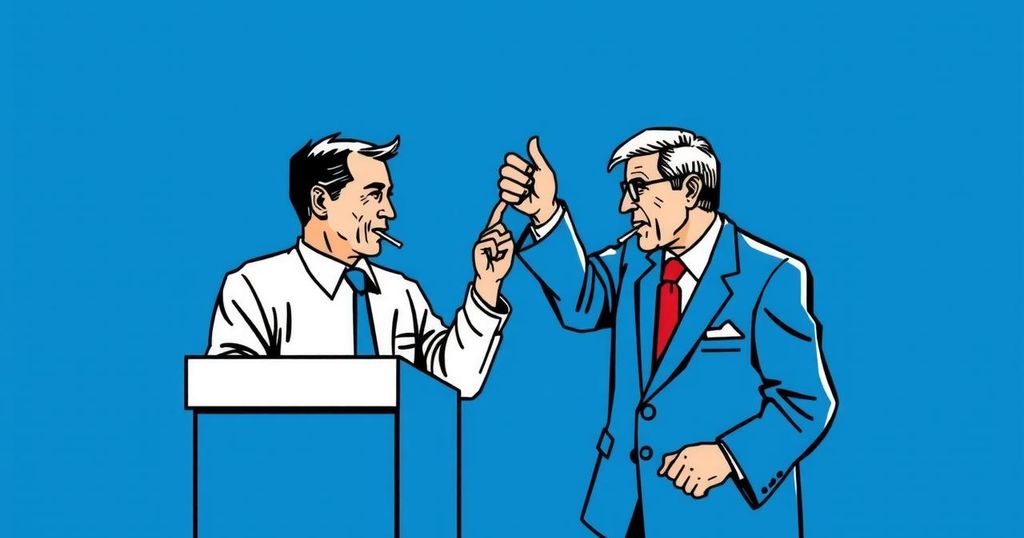World news
ALVARO DELGADO, ARGENTINA, ASIA, ATLANTIC, BROAD FRONT, COLORADO PARTY, CUBA, DELGADO, DEMOCRACY, ELECTIONS, FRONT, JOSE MUJICA, LATIN AMERICAN, LUIS LACALLE POU, MEXICO, NATIONAL PARTY, NORTH AMERICA, OR, PHILIPPINES, POLITICS, PRESIDENTIAL ELECTION, PRESIDENTIAL ELECTIONS, SOUTH AMERICA, TRADE RELATIONS, URUGUAY, VENEZUELA
Ethan Kumar
0 Comments
Uruguay’s Presidential Run-Off: A Testament to Democratic Coexistence
Uruguay held a peaceful presidential run-off between Alvaro Delgado and Yamandu Orsi, marking a commitment to democratic stability. With contrasting economic platforms, both candidates pledged to accept the election results and collaborate for the nation’s welfare, showcasing Uruguay’s reputation as a model democracy amidst Latin America’s political turmoil.
On Sunday, Uruguay held a presidential run-off election that showcased a commitment to democratic principles amid the more contentious political climates seen in other Latin American nations. The run-off featured conservative candidate Alvaro Delgado from the ruling National Party and left-wing candidate Yamandu Orsi from the Broad Front coalition. While Delgado secured 27 percent of the first-round vote, Orsi led with 44 percent but fell short of an outright majority, initiating the run-off to determine the presidential successor to outgoing President Luis Lacalle Pou.
Both candidates received considerable backing and focused their campaigns on boosting Uruguay’s economy. Orsi, a history teacher and former President Jose Mujica’s ally, pledged to enhance wages for low-income workers. Conversely, Delgado, a veterinarian by profession, emphasized reducing bureaucratic hurdles and enhancing international trade. Demonstrating respect for the electoral process, both candidates vowed to accept the election’s outcome and collaborate for the country’s benefit.
The calm atmosphere surrounding Uruguay’s elections contrasts sharply with recent political turbulence in Mexico and Venezuela, highlighting Uruguay’s reputation as a stable democracy. Local leaders have commended the peaceful election environment, underscoring the value of ‘democratic coexistence.’ As political analysts observed the tranquility of the election, Andres Ojeda remarked that the peaceful nature was so profound that a foreign observer would not recognize an election was occurring.
The Uruguayan elections exemplify the country’s resilience and adherence to democratic ideals, allowing voters to express their preferences without fear of violence or disorder. This composure is a stark and refreshing divergence from the political chaos prevalent in other parts of Latin America, affirming Uruguay’s standing as a model of democratic stability.
Uruguay, situated along the southern Atlantic coast, has emerged as a prominent example of democratic stability in Latin America. In recent years, the region has witnessed significant political strife, including election-related violence in Mexico and allegations of fraud in Venezuela’s elections. In contrast, Uruguay successfully navigated its electoral process with minimal conflict. The latest presidential elections, which included a run-off featuring key candidates from the conservative and left-wing spectrums, highlight the importance placed by its citizens on maintaining democratic norms and cooperation irrespective of the electoral outcomes.
The recent presidential run-off in Uruguay reflects a commendable adherence to democratic values, distinguishing the country from its more turbulent neighbors. Candidates Alvaro Delgado and Yamandu Orsi focused on critical economic issues while promoting a spirit of collaboration and mutual respect. The peaceful electoral environment and the emphasis on democratic coexistence symbolize Uruguay’s resilience and commitment to its political processes, reinforcing its position as a stable democracy in the region.
Original Source: www.aljazeera.com




Post Comment